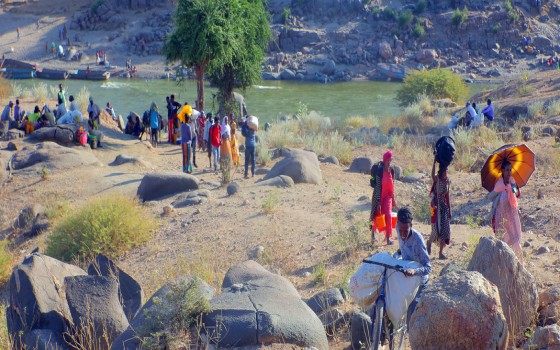
Climate Change: Environmental Obligations, Development, and Human Rights.. Dr. Abdel Moneim Sedky, Agricultural Research Center, Egypt

- Europe and Arabs
- Friday , 8 August 2025 9:46 AM GMT
Climate change represents one of the most complex challenges facing the international community in the modern era, given its interconnected impacts on the environment, the economy, development, and human rights. The growth of this phenomenon has firmly entered the core of international legal discourse, not only as an environmental issue, but also as an issue with humanitarian, justice, and developmental dimensions. Given this reality, a fundamental question arises: Does international law have the capacity and flexibility to address climate change as a comprehensive, multidimensional threat?
1- Climate Change as an International Legal Framework
The need for a comprehensive international legal framework to address climate change has emerged for decades. These efforts culminated in the 2015 Paris Climate Agreement, the most prominent contemporary environmental legal document. The agreement adopted a "common but differentiated responsibility" approach and established a system of voluntary pledges subject to review every five years, representing a shift from traditional binding frameworks to more flexible and comprehensive models. However, the agreement faces a number of fundamental criticisms, most notably the absence of clear legal enforcement mechanisms and the insufficient financial and technological support directed to developing countries, despite this being explicitly stated in Article 9. This reflects the limited implementation capacity of international environmental law, particularly in light of the economic and political disparities between countries in the North and the South.
2-Climate Change and Sustainable Development
Climate change poses a direct threat to the Sustainable Development Goals, particularly those related to poverty eradication, food security, health, water, and decent work. Although Goal 13 (Climate Action) focuses on enhancing countries' capacity to adapt to and mitigate the effects of climate change, this goal cannot be separated from the other goals, given the interconnected impacts of climate on all aspects of development. Developing countries face real difficulties in implementing their climate commitments without compromising their development priorities. While climate policies call for reducing dependence on fossil fuels, many poor countries still rely on them as a primary source of energy and economic growth. This calls for a rethinking of the relationship between environmental policies and the requirements of social justice and balanced development.
3- The Human Rights Dimension of the Climate Crisis
Climate change is no longer merely an environmental issue; it has become a human rights issue par excellence, directly and indirectly impacting several fundamental rights recognized in international human rights law, such as the right to life, the right to health, and the right to water, food, and shelter. The United Nations Human Rights Council has emphasized this connection on more than one occasion, considering that severe environmental damage may constitute an actual violation of human rights.
One of the most prominent judicial applications of this approach is the Urgenda case in the Netherlands, where the court deemed the state's failure to reduce emissions a violation of human rights, establishing the principle of the "positive duty of states" to protect the climate within the human rights framework.
4- Climate Change and Forced Migration
Environmental degradation and climate change have led to the emergence of the phenomenon of "environmental displacement," with millions forced to leave their homes due to drought, floods, or rising sea levels. Studies estimate that by 2050, the number of internally displaced persons due to climate change could exceed 200 million. Despite the magnitude of this phenomenon, international refugee law, as defined in the 1951 Geneva Convention, does not recognize the "environmental refugee" as a distinct legal category.
This legislative absence prompts calls to expand the concept of asylum, or at least develop international or regional protocols that guarantee legal protection for groups affected by climate disasters, ensuring a minimum level of dignity and human rights for these displaced persons.
5- Environmental Justice and International Trade
As some countries attempt to adopt stricter environmental policies, tensions arise between these policies and the requirements of the international trade system. Some environmental measures may be viewed as barriers to trade or as unjustified protectionist measures. Hence, recent trade agreements, such as the Canada-European Union Free Trade Agreement (CETA), have begun to incorporate environmental chapters that take climate standards into account without compromising the principles of free trade.
Integrating environmental considerations into the global trading system is a step toward achieving a balance between climate protection and the continuation of economic activity, but it remains controversial between developed and developing countries, given the disparity in capabilities and potential.
6- Holding Actors Accountable for Climate Harm
Calls are growing in legal and academic circles to hold major corporations and states accountable for the climate damage they cause to the environment and communities. In this context, the idea of including the crime of "ecocide" within the jurisdiction of the International Criminal Court has been proposed as a serious crime against the environment.
Although this crime has not yet been formally included in the Rome Statute, the growing interest in it reflects a growing global awareness of the need to strengthen deterrence and punishment mechanisms for those who intentionally or negligently cause widespread environmental destruction. Climate change is not merely an environmental crisis; it is a legal, humanitarian, and developmental challenge par excellence. Despite advances in international agreements, the international legal system still needs a comprehensive, just, and effective review. This requires a genuine integration of international environmental law, human rights law, and sustainable development law to ensure a just and comprehensive response to this multidimensional crisis, while simultaneously protecting human dignity and the environment.












No Comments Found